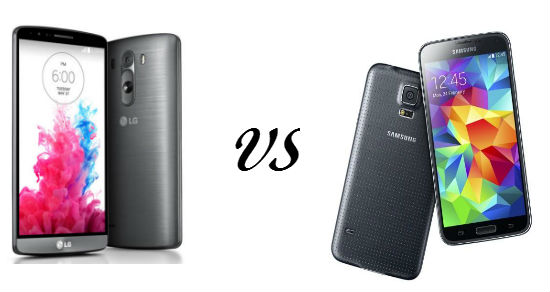Display and Processor
The LG G3 flaunts a 5.5 inch Quad HD display that results in a screen resolution of 2560×1440 pixels and an eye popping pixel density of 538 pixels per inch. LG has spent years of innovation to build this magnificent Quad HD panel that sets a new viewing standard as produces images that are clearer and sharper when compared to conventional smartphone displays. On the other hand, the Galaxy S5 is fitted with a 5.1 inch Super AMOLED display panel that boasts a FHD resolution of 1920×1080 pixels that results in a pixel density of 432 ppi. Both displays are protected with Corning Gorilla Glass 3 for that extra layer of protection. On comparing both these panels, the LG G3 has a screen resolution that is two folds higher than the one in the Galaxy S5. When it comes to the processing power department, the LG G3 incorporates a quad-core Qualcomm Snapdragon 801 SoC that can be clocked up to 2.5 GHz. In comparison, the Samsung Galaxy S5 is equipped with the Exynos 5 Octa 5422 chipset housing a 1.9 GHz quad-core Cortex A15 processor clubbed with a 1.3 GHz quad-core Cortex A7 processor. Interestingly, the LG G3 comes in two variants – 2 GB and 3 GB of RAM capacity, whereas the Samsung offering has only 2 GB of RAM. Samsung Galaxy S5 is in no way slow, but extra RAM on G3 is definitely a performance bonus and since S5 is shipping with Exynos chipset in India, LG G3 will outperform it.
Camera and Internal Storage
In terms of camera capabilities, the LG G3 features a 13 MP primary shooter with OIS+ (Optical Image Stabilizer Plus) and Laser Auto Focus. This camera is claimed to capture magnificently sharp images in a faster time frame as compared to the time taken by the transitional smartphone cameras. The Laser Auto Focus is a first of its kind technology in the smartphone industry and it allows the handset to capture the best moment at low light conditions using a laser beam to measure the distance between the camera and subject. Apart from these aspects, the camera comes with the new and innovative Simply Captivating feature to capture any snap in a jiffy. Handling the video calling and selfies segment is a 2.1 MP front-facer that has a large sensor, large aperture to take in more light and several other enhancements. In comparison to this innovative camera unit, the Galaxy S5 packs a 16 MP camera sensor at its back with usual traits such as auto focus, LED flash, FHD video recording and other Samsung exclusive features including Dual Shot and Simultaneous HD video recording and image capture. Also, there is a 2 MP camera at the front to assist in making video calls and help in clicking selfies. Storage-wise, both of them score equal weightage as they arrive in two variants – 16 GB and 32 GB of internal storage capacity that can be expanded up to a maximum storage of 128 GB using a micro SD card.
Battery and Operating System
The LG G3 tops this segment with a 3,000 mAh battery that is claimed to be paired with advanced optimization technologies to maximize its efficiency. It is stated that LG has used graphite instead of metal in the battery cathode to increase the lifespan of the battery of the LG G3. Whereas, the Galaxy S5 battery is a 2,800 mAh one that comes with the Ultra Power Saving Mode that will turn off the display and closes the unnecessary features in order to extent the battery life. Both the devices are fueled by Android 4.4.2 KitKat operating system. The Galaxy S5 features the TouchWiz UI while the LG G3 adopts a revamped graphic UI that uses minimalistic user interface and flat graphics.
Key Specs
Price and Conclusion
On the pricing front, the LG G3 is yet to receive an official price tag, but given that the other flagship devices such as Galaxy S5 are priced around Rs 50,000 this device is also undoubtedly expected to come with such a hefty price tag. The plastic build of the Galaxy S5 is definitely not a match for the polished metallic skin used on the rear of the LG G3 that makes the device look magnificent and contributes to its lightweight profile. However, the LG G3 misses out the IP67 certification and the fingerprint scanner that the Galaxy S5 comes with making it top the chart.
